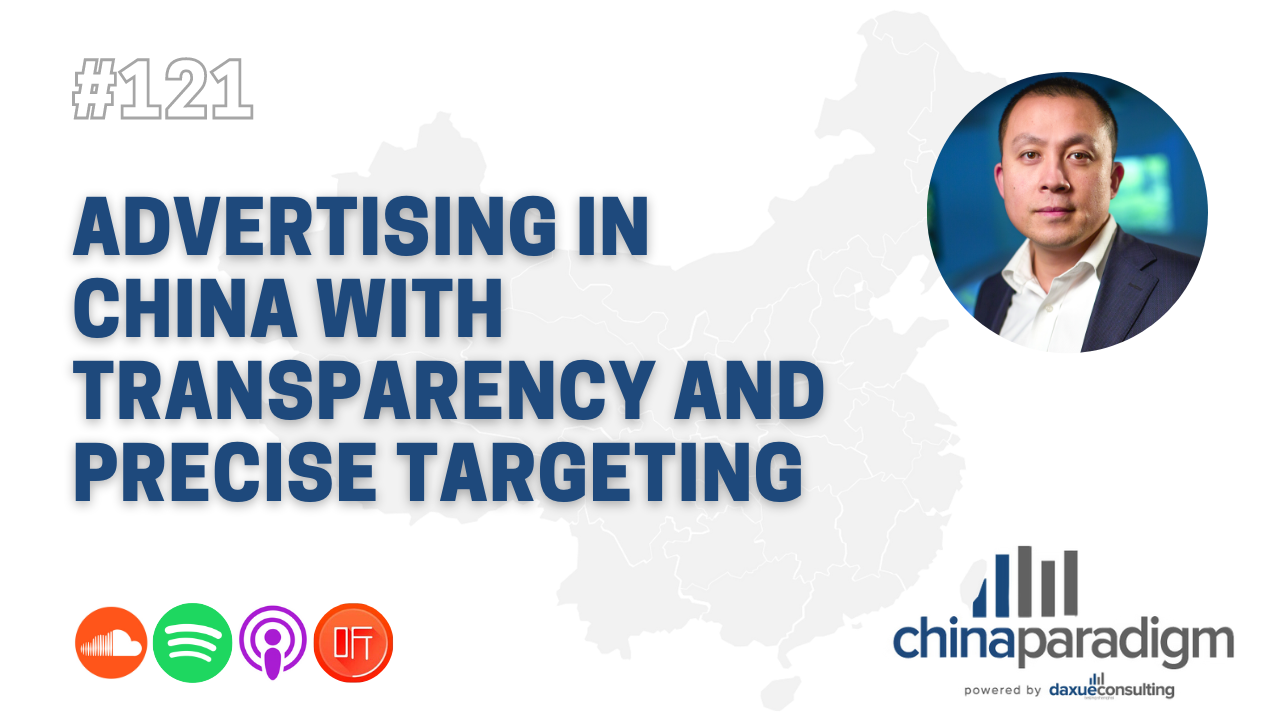Founded AdChina in 2015, AdChina.io provides a SaaS-based solution allowing foreign companies to do digital advertising in China across many local platforms. They received their first round of VC investment in 2019. Founder Jie Zhang’s educational experience was at Fudan University, where he studied physics. His previous work experience includes 10 years working for Huawei, starting in Xinjiang and Inner Mongolia before moving to Hungary in 2004 to develop Huawei there later in Denmark and Norway. He also worked in an intrapreneurial role for Telenor Communications, and he currently advises brands in a consultancy role on how to enter the China market. His corporate career ended in 2015 after doing his MBA at the prestigious INSEAD institute. Upon graduation, he began his entrepreneurial journey.
Listen to the full China Paradigm episode 121 on Youtube, Apple Podcast, Spotify, Soundcloud, or Ximalaya.
How did MBA school at INSEAD – lead to the beginning of an entrepreneurial journey?
Jie Zhang: At INSEAD, I went in there with a strong corporate background but became an entrepreneur. I met so many talented people there from every field, and I developed many business ideas. My roles at Huawei involved many expansion projects into Moldova and Serbia before doing the same in Denmark and Norway. Also, at Telenor, I was responsible for setting up a new business unit from scratch. So, I wasn’t totally new to entrepreneurialism.
Can you give us some background details about AdChina.io, such as company size and funding?
Jie Zhang: It started as GoDigitalChina in late 2015 as a media agency. In late 2017, we decided to switch to a SaaS model and created AdChina.io. It took us about 2 years to have the platform up and running. But we launched and received backing from 2 VCs in Norway. Last month we went through another B round of investment, and in total, we have raised around 2 million USD. We employ about 20 people across the world. Our team in Shanghai focuses on operations and software development. Our sales team is located in different countries like Norway, Australia, India, and Pakistan. We have over 100 clients from across the world, all continents except for Africa. In the beginning, most of our clients were in Scandinavia. We are a SaaS tool that advertisers and media agencies can use. We want to make the process of digital advertising in China more transparent and more automated.
How does AdChina.io work, what does it offer clients, and what is the pricing policy?
Jie Zhang: We wanted to make digital advertising in China simple to use and familiar to western advertisers. So, in terms of easiness of use, we are similar to Google Ads or Facebook ads. Because the digital advertising systems are different in China, it is frustrating for western digital marketers. They get strange reports, and they don’t understand the data. So we make digital advertising in China easier for them.
We have 4 different prices. Clients can use a free trial period of one month where we take 20% of ad spend. There is a starter option of 99 USD per month, plus we take 12.5%, then there is the “growth plan” package and the “scale plan” package. The scale plan goes up 699 USD per month plus 7.5% of ad spend.
Regarding the fixed monthly fee, we are cheaper than the competition but in terms of the % of ad spend that we take, we are slightly higher than the competition. That is because most companies waste a lot of money when they try to do digital advertising in China. They waste money because so many companies outsource work, so with our platform, it’s more transparent, and we cut out the middlemen agencies.
Also, our platform is connected directly to the media channels through APIs, and our clients don’t have to worry about the authenticity of their traffic. Also, sometimes the social media channels will discount if a company spends a certain amount of money on advertising. Other agencies will hide this from clients, but we will make this transparent with our clients. They can see exactly how much of a discount they are getting and exactly how much they are paying to do digital advertising in China.
How does the digital advertising platform, AdChina.io handle government censorship when it comes to advertising content in China?
Jie Zhang: For the content that western companies want to publish in China, we manage editing content manually right now. But we are working on an AI engine to automate some of the processes. But usually, every social media channel in China will approve content themselves before letting it go live on their platforms.
Mathieu David: Do AdChina’s digital marketing solutions also include LinkedIn advertisements in China?
Jie Zhang: Yes, it was quite difficult to work with LinkedIn APIs because all Microsoft products have very Chinese-specific guidelines, but we include LinkedIn China as one of the platforms companies and advertising agencies can use to do digital advertising in China
Does AdChina have access to all the big social media channels in China?
Jie Zhang: Yes, each platform requires a different amount of minimum investment and deposit. If you want to do digital advertising in China, one of the cheapest platforms is probably Baidu, and one of the most expensive is probably LinkedIn. But western digital advertisers need to know that Baidu is not equivalent to Google to build and expand a business. You need to go to other more specific platforms which are more suited to your brand.
We actually don’t work with Weibo because they don’t have APIs that other platforms can work with, so their process is not transparent and doesn’t align with our values.
Mathieu David: Your digital marketing platform sells on a SaaS basis. How is AdChina.io used by its clients?
Jie Zhang: Our clients often try out our platform as a kind of market survey to test if there is a market for their product. Brands that make a mistake when doing digital advertising in China are to rush in and advertise on every social platform and make big decisions early. They need to treat it as a slower process, make the important decisions, later on, fail fast and fail cheaply. That is why our platform is a good way to test the waters in China.
What is the philosophy behind AdChina.io?
Jie Zhang: China’s social media platforms evolve much faster than those in the west. When we came into the business, we knew that we would not be an expert on how to do digital advertising in China for every industry and on one or all of the platforms because there are so many new platforms, a new player emerges every 2 years. Our platform is there for clients to play around with it and experiment at a lower cost than focus all of their resources on one platform.
Mathieu David: What level of information does each social media channel offer on AdChina.io?
Jie Zhang: Gender, age, educational background, financial situation, device (android or ios), if house owner, or if the car owner. Not all of the social media channels provide the entire suite. Douyin tends to target people more by the content they like, so your content could be shown to a high-income consumer and a low-income consumer simply because they like the same video.
Mathieu David: Which social media channel should social media advertisers focus on in China?
Jie Zhang: It needs to be multi-channel, but the most detailed is WeChat. You can define your target the most clearly. But there are some disadvantages too, it is the most expensive, but a multi-channel approach is necessary. It would be foolish not to have a multi-channel approach for digital advertising in China.
Which Chinese social media platform makes it the easiest to target demographics according to their interests?
Jie Zhang: The tracking of social media user’s data started before data protection laws were widely enforced in China, so many companies could get in there early. Most of them are quite good in this regard. WeChat is probably the best in terms of tracking by “interests.”
On our platform, clients can also target consumers through “behavior” too.
Mathieu David: What level of programmable advertising can AdChina.io offer?
Jie Zhang: In terms of retargeting consumers, we don’t offer many solutions unless a client is looking to build a community and investing a lot in the lifetime value of their relationship with their customers.
How are Nordic brands perceived in China?
Jie Zhang: Scandinavia has a name in Chinese, so it is easier for Chinese people to identify and classify it. One of our first clients was the Scandinavian Tourism Board. We had to advertise for them in China. Then we decided to focus on 2 main themes attributed to Scandinavia, health and nature, and happiness with Denmark because it is more urban and has less nature. More recently, it focuses on the sustainability factor, which is all good marketing points. So, when we promote Scandinavian brands in China, we usually rely on these elements. Nature, health, happiness, and sustainability are what Chinese people think of when they think of Nordic countries and Nordic brands.
Mathieu David: What advice can Jie Zhang offer brands regarding cross-border eCommerce?
Jie Zhang: Cross-border e-commerce has the least amount of restrictions on other methods of entering China, and it has high costs in terms of digital advertising in China. Cross-border e-commerce is the best way to enter the China market. It allows brands to start small and maybe move to an e-commerce platform after a year or two if things are going well.
Which Chinese platform is best to start with for eCommerce?
Jie Zhang: Tmall is the best, but it also has the highest entry cost and is the most crowded. Some of the brands we have helped through Nordic Express have also tried to enter through WeChat mini-stores.
What did Jie Zhang learn during his time spent working for Huawei?
Jie Zhang: A lot, everything I know about business, I learned at Huawei. I mainly left because I was starting a family and it was too difficult to live out of a suitcase anymore. It’s a fun job because there are lots of challenges. We would meet customers during the day, have internal meetings at night and do training during the weekend. It’s like a college or the army because of the amount of time you spend together. They push you to the limits. It feels great when you achieve something because the work was so demanding, so it’s great for young, single people but not for people who have families.
Also, as a Chinese, there is a great deal of pride in Huawei. In 2004 when I came to Norway, I was not selling Huawei. I was selling China, trying to convince telecommunication companies that China could produce something other than manufactured goods.
Does the mispronunciation of Huawei in different parts of Europe affect brand recognition?
Jie Zhang: I don’t think it matters a great deal. The most important thing is the identity attached to the brand and the quality of what you produce.
Mathieu David: What is Jie Zhang’s point of view on the success of Chinese brands overseas?
Jie Zhang: You need to have resilience when you try to enter a new market. It would help if you had visionary people in charge of your company. Huawei’s leaders have that.
What does the next wave of Chinese companies that will be successful in the West look like in Jie Zhang’s opinion?
Jie Zhang: Probably fashion, there are companies like Bosideng which have been really successful outside China. There are so many Chinese companies that are operating on e-commerce platforms, but they are almost hidden. They turn over serious revenue, but their usual route to market is through companies like Amazon. They don’t compete so much with their brand, but they dominate online e-commerce in the west.
What is the experience of representing Maotai Baijiu in the Nordic countries?
Jie Zhang: It is a hobby rather than a business. I was happy to help them to investigate the market because I like the brand and I like the product. But Maotai is not really concerned with how much they sell in Europe. Actually, the more they sell outside China, the less they sell in China, plus the price in China is higher, so they are really not concerned with how much they sell in Europe. They advertise in the west as part of a branding initiative. Most of the consumers in Norway are Chinese tourists or the local Chinese community. But they have also tried to launch different innovative products like cocktails, ice-creams, and chocolates with baijiu. But I don’t think it will become a big thing anytime soon. It may become like sake, where it is served on special occasions.
Mathieu David: What unexpected business success has Jie Zhang witnessed in China?
Jie Zhang: Probably the technological advance, the digitalization of society. In the future, companies are going to be copying Chinese as opposed to the other way round. Also, many smaller brands have entered China successfully over the years, which is a positive.
How does Jie Zhang feel about working overseas instead of living and working in China?
Jie Zhang: I have had the privilege of returning home at least every 2 months for work, so I fly home and see my parent every 2 months. Being an entrepreneur has allowed me to be able to connect more often with China.
Mathieu David: What unexpected business failure has Jie Zhang witnessed in China?
Jie Zhang: Probably Amazon. At business school, I learned about the case of India and Russia, where foreign companies found it really difficult to succeed. I hope, and I suspect, foreign brands will continue to be successful in China.
When you want to do digital advertising in China, there are a few guidelines you should follow, according to Jie Zhang from AdChina.io.
- Use a multi-channel approach
- Only fools rush in – take your time when entering the digital marketing sphere in China!
- Have a trial period, test the waters before you commit serious money to digital advertising in China
- Cross border ecommerce with digital marketing is a great way for smaller foreign brands to enter China
- WeChat offers the most precise targeting but is also the most expensive
- Dealing with social media platforms directly is difficult for foreign brands because the Chinese data system is different and will be unfamiliar to Western digital marketing experts
- Dealing with other digital marketing agencies can be tricky because they will outsource a lot of the work which may then be outsourced again, this adds to the cost and makes the process less transparent
- AdChina.io makes it simple, transparent, and familiar to western digital marketers to engage with Chinese social media users
Listen to the full China Paradigm episode 121 on Youtube, Apple Podcast, Spotify, Soundcloud, or Ximalaya.





